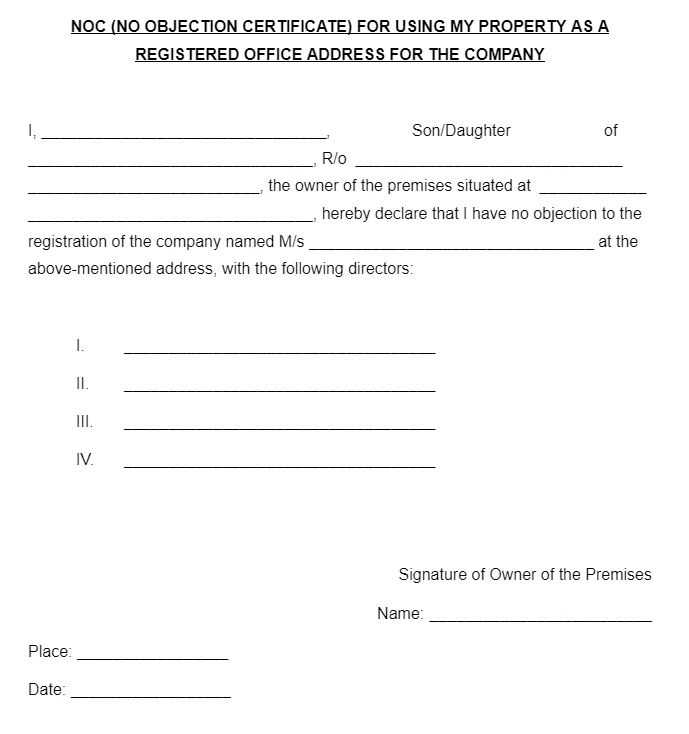
A No Objection Certificate (NOC) is an essential document used across India for various official purposes. True to its name, a NOC confirms that the issuing authority has no objection to a specific request or action.
Essentially, a NOC acts as formal permission. It lets you proceed with activities like:
- Education
- Employment
- Property matters
Getting a NOC assures you that the authority has reviewed your request and has no objections. This makes it an important step in many legal and administrative processes.
What are the Common Types of No-Objection Certificates?
NOCs come in different forms depending on the purpose and issuing authority. Here are some of the most common types:
1. Employment NOC
Companies issue this when employees want to pursue higher education or join another organization. The employment NOC certificate confirms you have fulfilled all obligations to your current employer.
2. Bank NOC
Banks issue this when you close a loan account or need to transfer property with an ongoing loan. You can check the bank NOC status online through the banking portal.
3. Municipal NOC
Local authorities provide this for construction, renovation, or land development activities. This NOC ensures your building plans comply with local regulations.
4. Educational Institution NOC
Schools and colleges issue this for students transferring to other institutions. The educational NOC certificate confirms that no dues are pending.
5. Property/ Real Estate NOC

Housing societies or property developers issue this when selling or transferring property ownership. This confirms that no maintenance dues are pending.
6. Pollution Control Board NOC
Industries and businesses that may impact the environment need this. This No Objection Certificate ensures environmental compliance with regulations and pollution control norms.
7. Import/Export NOC
Customs authorities may require this for specific goods or restricted items. This confirms compliance with trade licensing requirements.
8. Income Tax NOC
It is required when changing jobs in certain sectors or for high-value financial transactions. This confirms tax compliance and no pending dues with the Income Tax Department.
Note: NOCs may also be issued for other purposes, such as passport applications, marriage registration, vehicle transfers, or government tenders. Essentially, any activity requiring official approval could involve a No Objection Certificate.
Benefits of Obtaining a No Objection Certificate
Getting a NOC is like getting a green light that saves you from future headaches.

- Faster Approvals: A NOC speeds up approvals for your projects, applications, or business plans. Authorities see that all permissions are in place. This reduces delays and lets you start work quickly.
- Official Authorization: A NOC proves that the authority has approved your activity. It gives your work legal credibility. You can show it whenever needed.
- Prevents Complications: With a NOC, you face fewer disputes or objections from officials. It avoids misunderstandings. Your activities run smoothly and without interruptions.
- Avoids Fines and Delays: Working without a NOC can lead to fines or project stoppages. A NOC ensures you comply with rules. It protects you from penalties and unexpected delays.
How to Write a No Objection Certificate?
A No Objection Certificate format must follow specific guidelines. When learning how to write a No Objection Certificate, remember these key points:
- Use the official letterhead of the issuing organization
- Clearly state the purpose of the NOC
- Include all relevant details of the applicant
- Mention specific permissions being granted
- Add the date of issue and the validity period
- Include authorized signature and official stamp
The NOC form varies by organization, but these elements remain consistent across most formats.
How to Apply for a No Objection Certificate?
The application process differs depending on the issuing authority. However, general steps include:
- Identify the correct authority for your NOC requirement
- Collect necessary supporting documents
- Fill out the application for the No Objection Certificate carefully
- Submit your application through the proper channel
- Follow up on your NOC status regularly
- Collect your No Objection Certificate once approved
Many organizations now offer online NOC status checking systems. This digital approach makes tracking your application easier.
Documents Required for NOC Application
When applying for a No Objection Certificate, prepare these common documents:
- Identity proof (Aadhaar, PAN, Voter ID)
- Address proof (utility bill, rental agreement, or Aadhaar)
- Relevant application forms
- Proof of relationship with the issuing authority (if applicable)
- Purpose-specific documents (like property papers, educational certificates, or employment records)
- No dues certificates (from school, bank, housing society, or employer)
- Clearance certificates (for legal, tax, or environmental compliance, if required)
The exact requirements vary based on the NOC certificate type. Always check with the issuing authority before applying.
Validity of No Objection Certificate
Every No Objection Certificate has a specific validity period. The duration depends on the type of NOC and its purpose:
| Type of NOC | Validity Period |
| Property NOCs | 6 months to 2 years |
| Job-related NOCs | Covers your employment period |
| Construction NOCs | 1-3 years, based on project time |
| Business NOCs | 1 year |
| Education NOCs | Cover the academic year or the course length |
| Transfer NOCs | Permanent (once process is once process is complete) |
You should start the process of renewal 1-2 months before expiry to avoid legal problems.
Note: Some NOCs may also require periodic verification or updates, depending on regulations. Always check the NOC for its specific terms and conditions.
Common Mistakes to Avoid When Applying for a NOC
Applying for a No Objection Certificate may seem simple, but small errors can delay or even block approval. Avoid these common mistakes to ensure a smooth process:
- Incomplete Application: Don’t leave any fields blank. Fill out all required details accurately.
- Wrong or Missing Documents: Always attach correct identity proofs, address proofs, and purpose-specific documents.
- Incorrect NOC Format: Follow the proper no objection certificate format; avoid vague or unclear statements.
- Unsigned or Unstamped Certificates: Ensure the authorized signature and official stamp are present.
- Ignoring Validity Period: Check the NOC’s validity and start renewal well before it expires.
- Submitting to the Wrong Authority: Identify the correct issuing authority for your specific NOC type.
- Not Following Up: Track your application regularly to catch delays or additional requirements early.
Note: Always double-check your NOC application before submission. Verify all documents, signatures, and details. A careful review helps prevent delays, rejections, or legal complications.
When Do You Need a Legal Expert for NOC?
You may need legal help for your No Objection Certificate in several situations:
- Complex Legal Disputes: Hire an expert if authorities reject your NOC due to property fights, contractual conflicts, or inheritance issues.
- High-Value Transactions: Get legal guidance for major property deals, business sales, or investments where a rejected NOC could cause significant financial loss.
- Government Rule Problems: Use a legal consultant when dealing with multiple government offices, regulatory approvals, or environmental permits that could bring penalties.
- Criminal or Compliance Issues: Seek legal assistance if NOC denial could trigger criminal charges, litigation, or compliance violations.
- Document Errors: Use legal support to correct mistakes in submitted documents or missing information that could block approval.
- Contractual Issues: Hire a lawyer to draft, review, or verify agreements that include NOC clauses.
- Special Permits or Approvals: Seek legal guidance for industrial, import/export, or pollution control NOCs that involve strict rules and inspections.
- Disputed Ownership or Transfers: Consult an expert when ownership, tenancy, or transfer rights are unclear and could affect NOC issuance.
Need Help with Your NOC Application? We’re here to handle it for you!
Contact RegisterKaro today to get a NOC certificate that meets all the legal requirements and validity standards.
Frequently Asked Questions
Proceeding without a required NOC can lead to legal complications or penalties. Your application or project may be rejected. Authorities may also impose fines or force you to halt work. Always secure a NOC before starting regulated activities.




